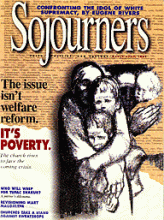The rivers of protesters flowing in the streets of Belgrade were as much a surprise to the world at large as they were to Slobodan Milosevic. Nonviolent Serbians? No less unexpected was the support the governmentÆs opponents received from an institution many regarded as lost in the archives: the Serbian Orthodox Church.
Milosevic had correctly counted on the West looking the other way during Serbias elections last Novembera reward for his having gone along with the program in Daytonbut he took the wrong measure of his own people. Overcoming years of bickering, opposition political groups forged a coalition called Zajedno (Together) and managed to win all but five of Novembers municipal elections, including Belgrade. What to do? Government-appointed judges were hurriedly called upon by the ruling party to declare the results invalid.
Having tasted victory at the ballot box, voters proved to be less cooperative than the judges. They poured onto the streets, waving everything from protest signs to kitchen aprons, and did this every daynot just a few thousand but in numbers beyond counting. There were days when journalists estimated between 400,000 and a half-million protesters in Belgrade alone.
Read the Full Article
